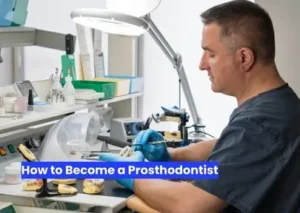How to Become an Endodontist: A Complete Career Roadmap for Dental Students
Understanding the endodontic career path stands as your initial step toward achieving your dream of working in dental specialty practice. Endodontists represent dental professionals with specialized training in examining tooth pain, together with completing root canal treatments and cavity-related procedures inside the tooth. To become an endodontist, one needs extensive education and clinical experience, together with intense dedication.The blog provides step-by-step guidance for all dental students and practicing professionals pursuing the rewarding field of endodontics. Our step-by-step guide will provide all necessary information about education and training and job opportunities, and the required skills for endodontists.
Who Is an Endodontist?
An endodontist is a dentist who specializes in treating the pulp and tissues inside the teeth. Most of their work revolves around performing root canals, saving natural teeth, and managing dental pain. Unlike general dentists, endodontists receive extra years of education and clinical training focused specifically on endodontic treatments. They use advanced techniques and equipment, such as microscopes and digital imaging tools, to diagnose and treat complex dental issues.Step-by-Step Guide on How to Become an Endodontist
1. The first requirement is to finish high school studying science, along with other related subjects. Your medical education commences with solid academic achievements from high school. Students should dedicate their studies to biology, chemistry, and physics classes. Good grades in these required courses will open doors to select undergraduate majors, which include preparation for becoming a dentist.2. Your undergraduate studies must include a Bachelor’s Degree program based on Biology or Chemistry majors. A 4-year undergraduate degree must be earned with specific preference for studies like biology, chemistry, and health sciences. To qualify for dental school, you must take specified prerequisite courses which include organic chemistry, anatomy as well and physiology.
3. Achieving the Dental Admission Test (DAT) score must happen ahead of the dental school application process. The standardized exam evaluates natural science understanding combined with your ability to understand texts and your performance in quantitative problems. Graduates who achieve high test scores have better opportunities of securing admission into respected dental institutions.
4. Complete Dental School (Earn a DDS or DMD Degree) education at dental school spans four years before students earn either Doctor of Dental Surgery (DDS) or Doctor of Dental Medicine (DMD) degrees. The initial curriculum during the first two school years consists of classroom study and laboratory work in general dentistry concepts. The last two years have been dedicated to practical patient treatment under direct supervision.
5. The process requires Participation in an Endodontic Residency program after satisfying the requirements. Obtaining your dental degree makes it possible to seek admission into a postdoctoral endodontics residency program. The training takes between 2 to 3 years while delivering both academic instruction and hands-on clinical practice sessions.
6. Obtain Licensure to Practice Dentistry Dental practice requires an endodontist to hold a dental license. All states in the U.S. have different licensure criteria for dentists, which demand success in the National Board Dental Examination (NBDE) and Integrated National Board Dental Examination (INBDE), along with state-specific clinical assessments. After obtaining your dental license, you can begin medical work as a dentist even though your residency continues.
7. Personal board certification is optional, though strongly advised by most professionals. The American Board of Endodontics (ABE) board certification demonstrates your exceptional endodontic skills, although it remains optional for the profession. Obtaining this certification requires passing a written exam in addition to a case review submission, followed by an oral examination.
8. You become eligible to practice after finishing all licensing and training. Private dental clinics and hospital facilities join group practices as employment opportunities, along with the chance to establish your endodontic practice. Many endodontists work with general dentists who send their patients for root canal treatments as well as other specialized procedures.
Skills Required to Be a Successful Endodontist
While technical skills are essential, an endodontist also needs soft skills such as:– Excellent hand-eye coordination for performing delicate procedures
– Patience and empathy to handle anxious patients
– Good communication skills to explain treatments
– Strong problem-solving abilities to diagnose complex cases
Conclsuion; How to Become an Endodontist
Your understanding of endodontist qualification demonstrates that this path demands devotion alongside top academic achievement and expert specialization. The career path provides strong satisfaction for dental workers who find joy in intricate procedures because it enables them to conduct pain relief treatments for patients through the preservation of their natural teeth. Endodontics presents both students who plan their studies and dental professionals exploring specialties with stable, extended career prospects, along with outstanding earning possibilities.If you’re serious about pursuing a dental specialty, now is the time to plan your path to becoming an endodontist. Research dental schools, prepare for the DAT, and look into accredited residency programs.





